Tag archives: quantum information
Happy New Year! The January 2017 issue of Physics World is now out
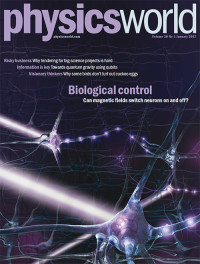 By Matin Durrani
By Matin Durrani
Happy New Year from all the team at Physics World!
To get things off to a cracking start, check out the January issue of Physics World magazine, which has a wonderful feature by Patrick Hayden and Robert Myers about how the study of “qubits” – quantum bits of information – could be key to uniting quantum theory and general relativity. The issue is now live in the Physics World app for mobile and desktop, and you can also read the article on physicsworld.com from tomorrow.
Elsewhere in the new issue, you can discover how physicists have waded into the debate over whether magnetic fields can control neurons and enjoy a great feature on why some birds don’t kick out intruder cuckoo eggs.
You can also find out just why so many physicists are worried about Donald Trump’s imminent inauguration as US president.
View all posts by this author | View this author's profile
Quantum technology 2.0
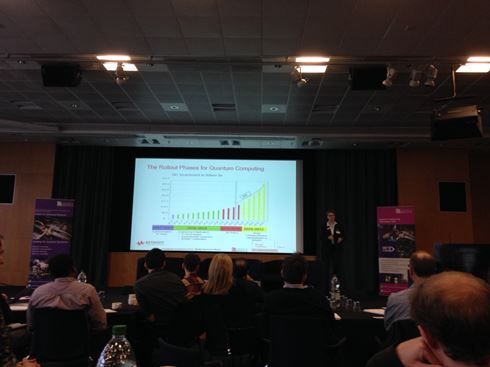
Niki Haines from Insight Technologies predicts the future of quantum computing.
By Michael Banks
Are we on the verge of a “quantum 2.0” revolution?
That was a question raised yesterday at an event that I attended at HP Labs in north Bristol, which was organized by the University of Bristol.
The day-long meeting featured a series of talks from industry about how quantum technologies are affecting business.
View all posts by this author | View this author's profile
Aspiring quantum physicists gather in Rome
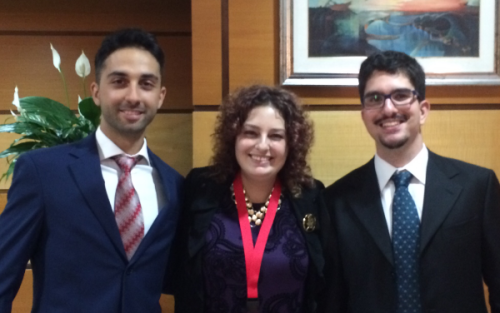
Up and coming: Fulvio Flamini (left) and Mario Ciampini (right) with Alaina Levine. (Courtesy: Alaina Levine)
By Alaina Levine
Recently I had the pleasure of travelling to La Sapienza University of Rome, to serve as the keynote speaker for the first ever Young Italian Quantum Information Science Conference. I was invited as part of a visiting lectureship programme run by the International Society of Optics and Photonics (SPIE), which supports SPIE student chapters around the world by providing travel funds for speakers.
The conference was a satellite of the annual Italian Quantum Information Science Conference (IQIS) and involved 95 students and postdocs from Italy and beyond. The day-long event was a great opportunity for the up-and-comers of quantum information to shine – and their technical talks demonstrated their expertise and passion.
View all posts by this author | View this author's profile
Looking toward the quantum-technology landscape of the future
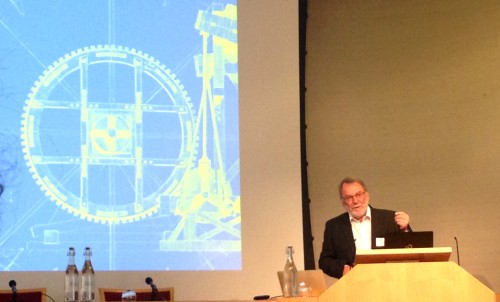
Futuristic views: Peter Knight opening the conference at the Royal Society in London. (Courtesy: Tushna Commissariat)
By Tushna Commissariat
Not a week goes by here at Physics World that we don’t cover some advance in quantum mechanics – be it another step towards quantum computing or error correction, or a new type of quantum sensor, or another basic principle being verified and tested at new scales. While each advance may not always be a breakthrough, it is fair to say that the field has grown by leaps and bound in the last 20 years or so. Indeed, it has seen at least two “revolutions” since it first began and is now poised on the brink of a third, as scientific groups and companies around the world race to build the first quantum computer.
With this in mind, some of the stalwarts of the field – including Peter Knight, Ian Walmsley, Gerard Milburn, Stephen Till and Jonathan Pritchard – organized a two-day discussion meeting at the Royal Society in London, titled “Quantum technology for the 21st century“, which I decided to attend. The meeting’s main aim was to bring together academic and industry leaders “in quantum physics and engineering to identify the next generation of quantum technologies for translational development”. As Knight said during his opening speech, the time has come to “balance the massive leaps that the science has made with actual practical technology”.
View all posts by this author | View this author's profile
China 101

Theorist Giulio Chiribella of Hong Kong University.
By Michael Banks in Hong Kong
“Hong Kong is a bit like China 101,” says Giulio Chiribella, a quantum-information theorist from Hong Kong University. “China for beginners.”
The native Italian ought to know, having spent three years in Beijing at Tsingua University before moving to Hong Kong last August.
View all posts by this author | View this author's profile
Getting a fix on quantum computations
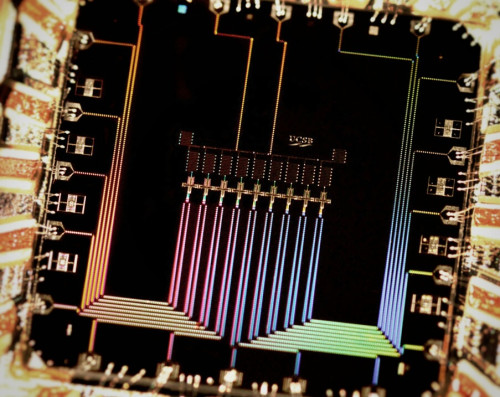
Bit of choice: A photograph of the nine superconducting qubit device developed by the Martinis group at the University of California, Santa Barbara, where, for the first time, the qubits are able to detect and effectively protect each other from bit errors. (Courtesy: Julian Kelly/Martinis group)
By Tushna Commissariat in New York City, US
Although the APS March meeting finished last Friday and I am now in New York visiting a few more labs and physicists in the city (more on that later), I am still playing catch-up, thanks to the vast number of interesting talks at the conference. One of the most interesting sessions of last week, and a pretty popular one at that, was based on “20 years of quantum error correction” and I went along to the opening talk by physicist John Preskill of the California Institute of Technology. I had the chance to catch up with Preskill after his talk and we discussed just why he thinks that we are not too far away from a true quantum revolution.
Just in case you haven’t come across the subject already, quantum error correction is the science of protecting quantum information (or qubits) from errors that would occur as the information is influenced by the environment and other sorts of quantum noise, causing it to “decohere” and lose its quantum state. Although it may seem premature that scientists have been working on this problem for nearly two decades when an actual quantum computer has yet to be built, we know that we must account for such errors if our quantum computers are ever to succeed. It will be essential if we want to achieve fault-tolerant quantum computation that can deal with all sorts of noise within the system, as well as faults in the hardware (such as a faulty gate) or even a measurement.
Over the past 20 years, theoretical work in the field has made scientists confident that quantum computing of the future will be scalable. Preskill says that “it’s exciting because the experimentalists are taking it quite seriously now”, while initially the interest was mainly theoretical. Previously, scientists would artificially create the noise in the quantum systems that they would correct but now actual quantum computations can be fixed. Indeed, Preskill says that one of the key things that has really moved quantum error correction along in the past few years is the concentrated improvement of the hardware used, i.e. better gates with multiple qubits being processed simultaneously.